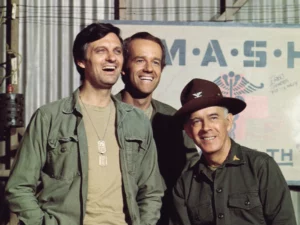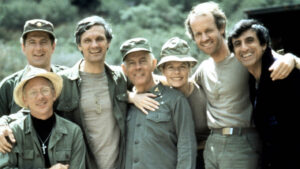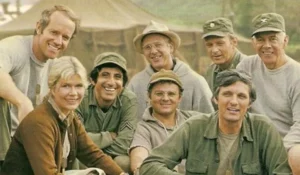Great television shows are remembered for many things—their characters, their stories, their cultural impact. But the truly legendary ones are defined by moments of dialogue so perfect, so powerful, that they transcend the screen and become part of our collective consciousness. MAS*H delivered more of these moments than perhaps any other sitcom in television history. These weren’t just clever one-liners or witty comebacks—they were windows into the human soul, revealing truths about war, friendship, mortality, and what it means to be human under impossible circumstances.
The Power of Words in a War Zone
What made MAS*H’s dialogue extraordinary was its ability to shift seamlessly between comedy and tragedy, often within the same conversation. The writers understood that real people don’t speak in consistent tones—we joke to deflect pain, we philosophize when exhausted, we say profound things accidentally and trivial things intentionally. This authenticity made the show’s most memorable exchanges feel less like scripted television and more like eavesdropping on real conversations in the 4077th.
The show’s writers room included veterans, doctors, and deeply thoughtful individuals who understood that dialogue serves multiple purposes simultaneously. A single exchange could advance the plot, reveal character, provide comic relief, and deliver social commentary all at once. This layered approach to writing created dialogue that rewarded repeated viewing—you’d catch new nuances and meanings each time you heard these exchanges.

When Humor Masks Heartbreak
One of the most defining characteristics of MAS*H’s dialogue was its use of humor as a defense mechanism against horror. The doctors and nurses didn’t crack jokes despite the terrible things they witnessed—they made jokes because of them. This coping strategy produced some of television’s most memorable dark comedy, where laughter and tears became indistinguishable.
Hawkeye Pierce mastered this technique throughout the series. His rapid-fire wit and absurdist humor served as armor against the psychological toll of war. But the show’s genius was in occasionally letting that armor crack, revealing the wounded man beneath the wisecracks. These moments of vulnerability, when Hawkeye’s jokes failed him and he had to speak plainly about pain and fear, created some of the series’ most powerful dialogue.
The interplay between humor and horror reached its peak in operating room conversations. Surgeons would discuss mundane topics like food, sports, or dating while performing life-saving surgery on wounded teenagers. This juxtaposition wasn’t disrespectful—it was survival. The dialogue captured how people in extreme professions maintain their sanity by compartmentalizing, by treating the extraordinary as ordinary.

Philosophical Debates in the Swamp
Some of MAS*H’s most memorable exchanges occurred in the Swamp, the tent Hawkeye shared with his tentmates. These late-night conversations, often fueled by homemade gin, explored profound questions about morality, duty, and the nature of war. The cramped, intimate setting allowed for honest dialogue that would have felt out of place in more public areas of the camp.
These philosophical discussions never felt preachy or forced because they emerged naturally from the characters’ circumstances. When you’re living in a war zone, watching people die daily, big questions about life and death aren’t abstract—they’re immediate and personal. The dialogue reflected this urgency, with characters grappling with moral dilemmas that had real consequences for real people.
The show also excelled at presenting multiple perspectives without declaring a winner. When Hawkeye and Charles Winchester debated the value of different approaches to medicine, or when Father Mulcahy and Hawkeye discussed faith and doubt, the writers respected both viewpoints. This nuanced approach to dialogue created conversations that felt authentic rather than didactic.

Confrontations That Revealed Character
MAS*H featured numerous heated arguments and confrontations that stripped away pretense and revealed who these people really were. These weren’t melodramatic shouting matches—they were honest expressions of frustration, fear, and fundamental disagreements about how to survive with dignity intact.
The evolving relationship between Hawkeye and Margaret Houlihan produced some of the series’ most interesting confrontational dialogue. Early episodes featured sharp exchanges where they attacked each other’s competence and character. But as both characters matured, their arguments became more sophisticated, addressing real differences in philosophy and approach rather than just trading insults. This evolution in their dialogue mirrored their character development beautifully.
Colonel Potter’s arrival brought a different kind of confrontational dialogue—the tough love of an experienced commander who had seen too much to tolerate nonsense but cared too much to be harsh without purpose. His exchanges with the younger doctors balanced authority with empathy, showing how effective leadership communicates through both what is said and how it’s said.

Goodbye Scenes That Broke Hearts
Few shows have handled departures as well as MAS*H, and the dialogue in these farewell scenes remains some of television’s most emotionally powerful. The writers understood that goodbyes in war are different from ordinary farewells—they carry the weight of uncertainty, the possibility that this might be the last conversation, the need to say everything important while revealing nothing too vulnerable.
When major characters left the series, their final conversations avoided melodrama while still delivering emotional impact. The dialogue in these scenes focused on what was left unsaid as much as what was spoken. Characters struggled to express feelings they’d kept hidden, to acknowledge bonds they’d pretended were casual, to say goodbye when they’d always avoided that word.
The series finale featured multiple farewell conversations, each tailored to the specific relationships involved. Some were tearful, others were stoic, but all felt earned and authentic. The dialogue captured how different people process endings differently—some need closure through words, others through silence, and the show honored both approaches.
One-Liners That Carried Weight
While MAS*H excelled at extended exchanges and philosophical debates, it also delivered countless memorable one-liners that packed entire philosophies into single sentences. These weren’t just clever quips—they were distillations of character and theme that revealed deep truths economically.
Hawkeye’s one-liners often masked pain with humor, delivering social commentary through jokes. His quick wit served multiple functions—it entertained, it deflected, it challenged authority, and it kept him sane. The best of these brief remarks worked on multiple levels, funny on the surface but revealing deeper meanings upon reflection.
Other characters contributed their own memorable brief exchanges. Radar’s innocent observations often cut through complexity to reveal simple truths. Colonel Potter’s folksy wisdom delivered profound insights through homespun language. Even minor characters occasionally delivered lines that resonated far beyond their screen time.
Medical Urgency in Dialogue
The operating room scenes featured a unique type of dialogue—urgent, technical, focused, yet still revealing character and advancing themes. The medical terminology was accurate, the procedures realistic, but the conversations happening over the operating table explored everything from trivial gossip to existential questions.
These scenes demonstrated how professionals communicate under pressure—efficiently, clearly, but not without personality. A surgeon might request an instrument while simultaneously making a joke or philosophical observation. This multitasking in dialogue showed how people in high-stress professions maintain their humanity even when focused on technical tasks.
The contrast between the clinical language of surgery and the emotional reality of treating wounded soldiers created powerful dramatic tension. Doctors would use precise medical terms to describe procedures while knowing they were working on someone’s son, brother, or father. This disconnect between professional detachment and emotional involvement produced some of the show’s most affecting dialogue.
Letters Home and Monologues
MAS*H occasionally broke from traditional dialogue to feature letters home or internal monologues. These solitary moments of speech allowed characters to express thoughts they couldn’t share with others, providing insight into their internal struggles and private fears.
Hawkeye’s letters to his father revealed a softer, more vulnerable side than he showed to his colleagues. These epistolary moments featured different dialogue rhythms—more reflective, less defensive, occasionally more honest about his fears and doubts. The contrast between how Hawkeye spoke to others and how he wrote to his father showed the masks we wear for different audiences.
The episode structured entirely around a documentary interview featured characters speaking directly to camera, a departure from normal dialogue patterns that revealed new dimensions of familiar personalities. This format allowed for confessional moments that wouldn’t have fit naturally into regular conversations.
The Legacy of Words
What makes MAS*H’s dialogue endure is its fundamental humanity. These conversations feel real because they capture how people actually talk when facing extraordinary circumstances—with humor and horror intertwined, with philosophy and profanity mixed together, with love expressed through insults and pain hidden behind jokes.
The show’s writers understood that great dialogue doesn’t just sound good—it reveals character, advances plot, explores themes, and resonates emotionally. Every memorable exchange from MAS*H accomplished multiple goals simultaneously, creating layers of meaning that reward repeated viewing and continued reflection.
Decades after the series ended, these dialogues remain quotable, relevant, and powerful. They’ve influenced countless writers and shaped how television approaches serious subjects through comedy. More importantly, they’ve given audiences language to discuss war, loss, friendship, and survival—proving that the right words, spoken at the right moment, can change how we understand ourselves and our world.